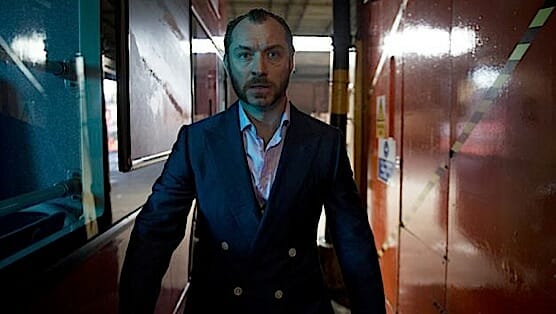The opening scene in the dark comedy Dom Hemingway, written and directed by Richard Shepard (The Matador, The Hunting Party), is revelatory. Dom (Jude Law) supports himself against bars in a jail hallway as he’s being serviced below by an unseen partner. He’s in the midst of a soliloquy—a sort of ode to his … little Dom (using much more vivid descriptors). The camera remains up close on Law’s face throughout the sequence, introducing audiences to their leading man—a crude and vulgar criminal with bad teeth and a healthy ego.
In less-skilled hands, this scene could have easily been overacted, coming off as silly, but Law truly commits to the character, sucking the marrow from the role then belching it back out onscreen. Law, who gained weight for the role, looks rough around the edges. But despite Law’s performance, the film can’t quite sustain the heights set by its full-throttle start.
After serving 12 years in prison, safecracker Dom Hemingway is finally free. He’s looking to collect a reward for keeping his mouth shut to protect his boss. Before heading to France to meet Mr. Fontaine (Demian Bichir), he unleashes his id on London for three days, first finding the bloke who had the audacity to marry his (now-deceased) wife while Dom was away. (It doesn’t matter that they were already separated.) Dom pummels the guy at his workplace, and no one dares to intervene because they all know that Dom’s always been a little unhinged.
With his loyal partner Dickie (Richard E. Grant) along for the ride, Dom embarks on the bender with copious amounts of cocaine, beer and women, all gifts from Fontaine. On the train to the French countryside, Dom explains to Dickie the magnitude of his hangover: “Cossacks are sodomizing my cranium.” The colorful dialogue peppers the script, and while at times offensive, it fits Dom’s racist, chauvinistic and violent tendencies. Grant plays the dour yet loyal companion dutifully, but his character never develops fully, only existing to serve as the ego to Dom’s id.
At Mr. Fontaine’s estate, Dom has a meltdown, insulting the supposedly Russian crime boss (who sounds too much like Dos Equis’ most interesting pitchman). There are large, comic and creepy monkey photographs (by artist/photographer Jill Greenberg) that hang on walls of the Fontaine’s study to serve as a visual counterpoint to Dom’s state of mind. Shepard script continues to provide snippets of comic relief amid all the tension, including when Dom finally realizes that Dickie wears a single a black glove because he lost a hand. “I thought it was a fashion statement,” says Dom, before returning to his argument with Fontaine.
Despite the disrespect leveled at the crime boss, which includes flirting with his girlfriend Paolina (M?d?lina Diana Ghenea), Dom inexplicably still gets his money. (The ruthless Fontaine quickly develops a heart.) They celebrate together with cocaine, alcohol and women serving as booty prizes. (Consider yourself warned: The objectification of women is rampant throughout the film.) The celebration quickly ends when Dom loses control of a car on a rain-soaked road during a visually stunning—yet somehow humorous—slow-motion crash sequence.
At this point, the film shifts to a family drama. Paolina has run off with Dom’s money, and instead of chasing after her, Dom tries to re-connect with his estranged daughter (Emilia Clarke), in a quiet and nuanced performance by the almost-unrecognizable Game of Thrones actress. Simultaneously, Dom tries to get a job from a local thug, Lestor (Jumayn Hunter), whose father was Dom’s nemesis. The introduction of the young gangster seems extraneous, and only spins the story into another different direction.
From the outset, Dom Hemingway is teed up for a British caper/revenge film, but the story meanders between a road trip movie, a character study and family drama, with largely mixed results. While it’s an entertaining ride, thanks largely to Law’s commitment and Shepard’s comic dialogue, the story becomes too bloated for its own good. The payoff scene at the end comes across as almost an afterthought. What remains are too many unanswered questions and head-scratching choices from the film’s characters, many of whom are one-dimensional and pale in comparison to the lively lout that is Dom Hemingway.
Christine N. Ziemba is a Los Angeles-based pop culture writer and regular contributor to Paste. You can follow her on Twitter.
Director: Richard Shepard
Writer: Richard Shepard
Starring: Jude Law, Richard E. Grant, Demian Bichir, Emilia Clarke, Kerry Condon, Jumayn Hunter, Madalina Ghenea, Nathan Stewart-Jarrett
Release date: Apr. 2, 2014
